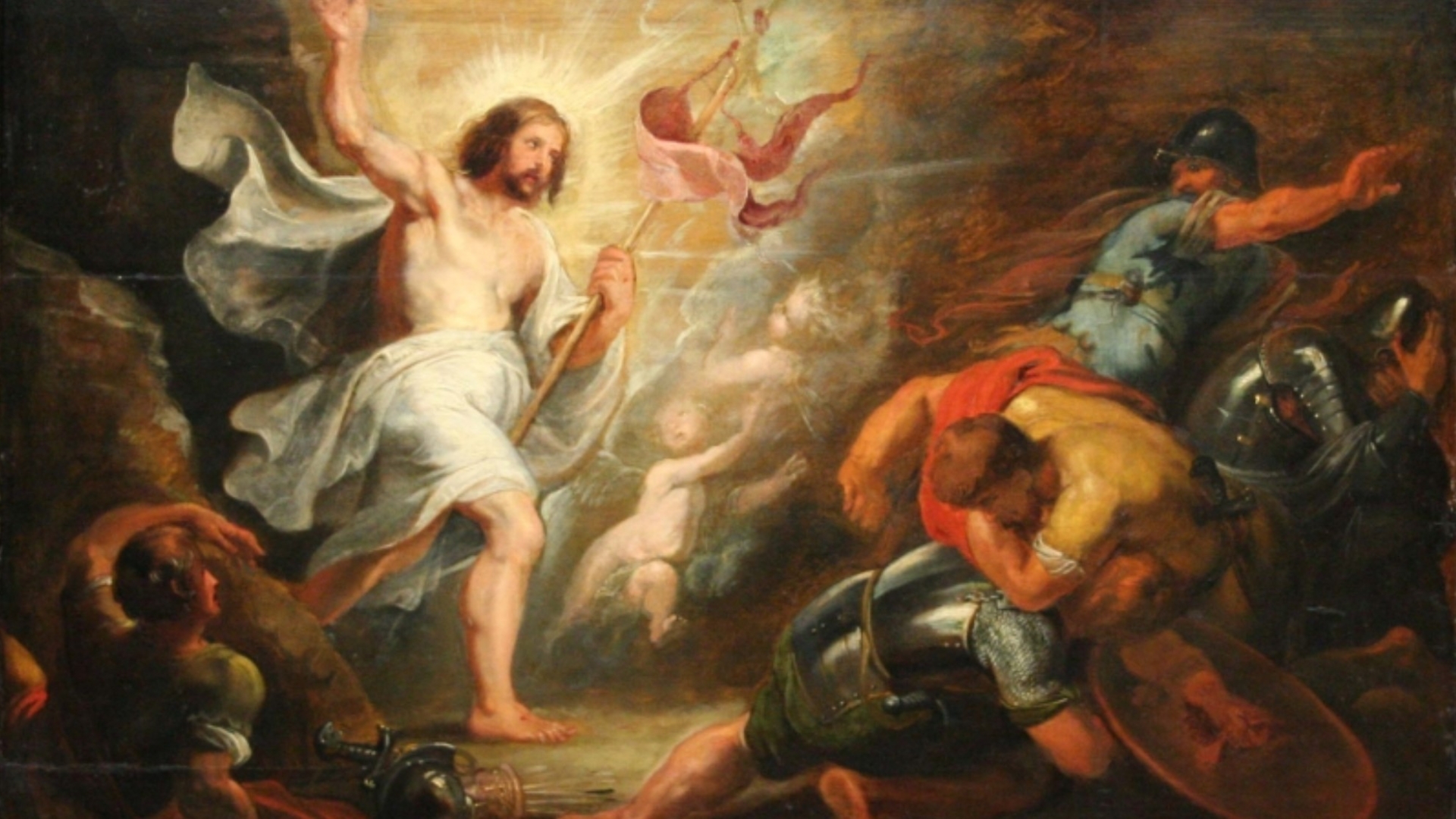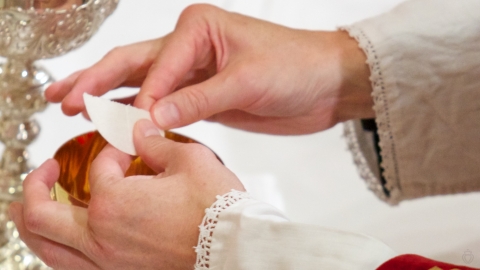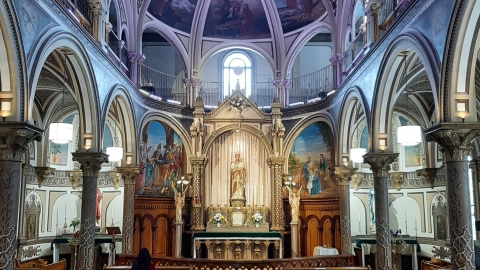The Feast of Easter

"This period is the most sacred portion of the religious year, the one towards which the whole liturgical cycle converges."
HISTORY
Everything was to be supernatural in the redemption of humanity and thus transferred, as Saint John says (1), from the death of sin to the life of grace, which prepares it to enter the eternal life of glory. It was highly appropriate that this passage should be announced by a figure of speech in which the supernatural intervention of God was manifested in the history of the Hebrew people, and which is entirely figurative and symbolic. (2)
This was the character of the ancient Passover. God wanted to force the Pharaoh of Egypt to let His people out of the land of bondage with a final plague. He commanded all the Israelites to slaughter a lamb on the same day and to eat it in each family, with the lamb’s blood staining their doors. During the following night, the exterminating angel put to death all the firstborn of the oppressor people and passed the houses of the Hebrews, marked with the protective sign. The frightened tyrant, no longer daring to fight against the Lord, finally consented to the departure of the descendants of Jacob, who crossed the Red Sea to the promised land and were again miraculously protected from the pursuit of Pharaoh. These two events, closely linked together, were called the Passover, from the Hebrew word Pesach, which means passage. The Jews celebrated every year, on the fourteenth day of the first lunar month, the deliverance of their ancestors. This feast was the greatest of their solemnities.
Each year also brings back for Christians the anniversary of the true Passover prefigured by the old one. Our Paschal Lamb" says St. Paul, "is Jesus Christ, who was slain. (3) His glorious resurrection, which was for him the passage from death, which he had voluntarily suffered, to life which he has taken back forever. This is the principle of our passage from the spiritual death of sin to the divine life of grace. It is through grace that we will pass from time, which is a kind of death because of the miseries we encounter in it, to eternity where we will be put in possession of the fullness of true life. By His virtue too, death will be definitively defeated and destroyed on the day of the universal resurrection. (4) Our bodies themselves, torn from the tomb, will pass from the humiliation of death to the glory of a new life, and by their reunion with our divinized souls, will be invested with immortality. And so it will be, because Jesus Christ, our Paschal Lamb, by reuniting in himself the human nature with the divine nature, became the new man, the new Adam, and thus wished to make all the members of humanity, regenerated and restored in him, participate in his divine life and his glory.
The mystery of the Passover of the New Testament was, therefore, the goal, as it is the necessary complement and the marvelous summary of all the other mysteries which enter the great work of redemption. The name rightly applied to the figure who announced it, is eminently appropriate to it, and indicates to us exactly both meaning and scope.
The Christian Passover succeeded the Jewish Passover without interruption because, just as the Jews had always taken to heart the celebration of their deliverance from the bondage of Egypt with an extraordinary solemnity, so the Christian Church had to consecrate especially the remembrance of the great event which is the principle of the transformation of redeemed and saved mankind, and on which the whole of religion rests, as St. Paul attests. If Jesus Christ has not risen," he says, "our preaching is worthless, and your faith is in vain. (5) For then you are still buried in sin, and all who have fallen asleep in Christ Jesus are lost. And if we have hope in Christ Jesus only for this life, we are the most miserable of men”. This feast is certainly of apostolic institution. Saint Augustine affirms it (6), and Tradition, whose first testimonies are contained in the book of the Acts of the Apostles, is constant and leaves no doubt on this point.
It is conceivable that, the resurrection of the Savior being the culminating fact of the whole redemption, the feast which perpetuates the memory of it had to be the highest and the principal of all those which the Christian Church instituted. The various names that have been given to it express its excellence. The Roman Martyrology calls it the Solemnity of Solemnities. Rupert, writing in the twelfth century, collected the following names: Holy Sunday, the Honour of the Year, the Glory of the Month, the August Day, and the Splendor of the Hours. It did not seem sufficient to the Church to celebrate this mystery in one day. Until the eleventh century, solemnity was prolonged during the octave, in which no work was done. A Council of Meaux, held in 845, decreed that the eight days of the solemnity of Easter would be celebrated by all Christians. A Council of Macon, assembled in the ninth century, forbade all servile work during Easter week. The solemnity, with the obligation to attend Mass and to abstain from servile work, was later reduced to three days throughout the Church, and even shortened to one day in France by virtue of the Concordat; but the piety of the faithful still could not bring itself to consider Easter an ordinary solemnity and the custom was maintained of holding a public service on Monday. Easter, like all the principal feasts, has an octave, which is of an apostolic institution; but the memory of the great event that it recalls extends far beyond it until the Saturday following Pentecost. This period is the most sacred portion of the religious year, the one towards which the whole liturgical cycle converges. All this time is like a single feast day. If the Jews," says St. Ambrose, "not content with their weekly Sabbath, celebrate another Sabbath which lasts a whole year, should we not do even more to honor the resurrection of the Lord? So, they taught us to celebrate the fifty days of Pentecost as part of the Passover. These are seven full weeks, and the feast of Pentecost begins an eighth. During these fifty days, the Church forbids herself to fast, as on Sunday when the Lord was raised; and all these days are like one and the same Sunday. (7)
SIGNIFICANCE OF THE PASSOVER
The Christian Passover, as we have said, is the logical completion of the whole redemption. In the person of the risen Christ, mankind whom He has saved appears to us at first as regenerated by a new birth that has put it in possession of spiritual life. Baptism, which in the past was solemnly conferred on adults on Holy Saturday, recalled, as well as brought about, this first spiritual resurrection. Do you not know then," says St. Paul, "that all of us who were baptized into Christ Jesus were baptized into his death? For in baptism, we were buried with him to death, that as Christ Jesus rose from the dead by the glorious operation of his Father's power, so we should walk in the ways of a new life. If we have been taken upon him in the likeness of his death, we shall also bear the likeness of his resurrection, knowing that the old man which was in us was crucified with him, that the body which belonged to sin might be destroyed, and that henceforth we should no longer be in bondage to sin. (8)
By a natural consequence of this first regeneration, and in order that the transformation of our nature might be complete, we shall also participate, even in our body, in the glorious resurrection of the Savior. This hope, which was deeply engraved in the heart of Job and sustained his constancy amid the most terrible trials, is confirmed to us by the fact of the triumph won by Jesus Christ over death. The Apostle, after having established that the whole of religion rests on this great event, asserts that our own resurrection is the necessary consequence of it: "Jesus Christ, risen from the dead, is the firstborn of those who have fallen asleep; for as death came by one man, so must the resurrection of the dead come by one man; and as all die in Adam, so shall all live in Christ Jesus. But each one will come in his own place: first Jesus Christ, as the first fruits, then those who belong to Jesus Christ and who have believed in his coming. His kingdom must extend until His Father has put all His enemies under His feet. Death, the last enemy, will be destroyed in its turn. Then the Son will be subject to Him who has subjected all things to Him, and God will be all in all." (9)
On the day after His resurrection, our Lord, walking with two of His disciples on the road to Emmaus, said to them: "Was it not necessary that Christ should suffer and so enter into His glory?" (10) And a few moments later, He made the apostles understand, gathered with other disciples, that "it was necessary for Christ to suffer and rise on the third day". (11) It is therefore by His passion and resurrection that our Redeemer, having completed His mortal life was able to introduce our humanity into the place of glory, where, according to the words of Saint John, "there is no more time," (12) and it is there that all of us, successively, must be reunited with Him, following "the way he has opened to us." (13) Blessed eternity, then, is the true Passover, the feast without end where we will be spiritually and unceasingly nourished and satiated by the victorious Lamb who holds the book of life (14) and has called us all to his wedding feast. (15) For this reason, the Passover of this world is the feast of feasts and the solemnity of solemnities, since it is for us the sure pledge of the definitive triumph and of the unending happiness which it will give us. The Holy Church wants us to consider ourselves as already risen with Jesus Christ, as already enjoying eternal life in anticipation. Many Fathers tell us that the fifty days of the Easter season are the image of the blessed eternity. This thought will be recalled to us during the whole liturgical year on Sunday, which is the day on which our Lord rose from the dead. A new creation was finished, superior to the first and much more marvelous. Just as after having brought the sensible world out of nothing and having ordered it, God rested; so, after this great work of rebuilding the spiritual and moral world, the incarnate Word entered by His resurrection into His eternal rest, and Sunday, the Lord’s Day, became our Sabbath on earth and the image of the eternal Sabbath.
HOW TO SPEND THE PASCHAL TIME
On Easter Day and throughout the Octave, the Church delights in repeating in every part of the Divine Office; "This is the day that the Lord has made; let us rejoice and be glad!" This is indeed the day par excellence, the day near which all other days pale, though God has wrought great things in these days also. The paschal mystery is their goal and end, and it is also their magnificent achievement. The day in which the glory of our Savior bursts forth is also our day, since, having died for us, He has risen for us. With Him we have triumphed, both over sin, which is the death of the soul, and over the death of the body, which is the wages of sin. (16) We now live in Him and through Him; with Him and following Him we will go to celebrate the great Passover in heaven, that day of the eternal feast. The penitence of Lent and the sadness of the time of the Passion must therefore disappear and would no longer be in season. In this day which the Lord has made, we have only to rejoice and to be glad. Throughout the Easter season, the Church never ceases to sing and to make us repeat with her the Alleluia. It is a cry of joy, a song of triumph, a hymn of gratitude. This is the true joy, the joy that befits the children of God, but which is reserved for those who considered themselves resurrected with Jesus Christ. Let us, therefore, say with all our hearts and repeat unceasingly this Alleluia, which we will repeat forever and ever, when we are in company with and following our glorified Redeemer.
But in order to have the right to surrender to this heavenly joy, we must be united to the Lamb who takes away the sins of the world (17); we must wash our robes in His purifying blood. (17) Only those who are pure enough to follow him on earth can enjoy the peace He has brought to the world and taste the joy that accompanies His presence in souls. We must therefore pray to Him to make us participate more and more in His resurrection, by freeing ourselves more and more from sin which diminishes the spiritual life in us, even though it is not so serious as to throw us into death. Because we should passionately desire the glory of a Savior who loved us so much, let us pray to Him with fervor to resurrect the many souls whom sin has killed and who do not feel their misfortune, or who cannot bring themselves to make the effort that Jesus asks of them in order to pull them out of the tomb whose heavy stone crushes them, and where they are given over to corruption.
In this Easter season, the Church, interpreting the express will of her Bridegroom, who has declared that we can have life in us only as long as we eat His flesh and drink His blood, (19) makes it a rigorous obligation for us to take part in the great solemnity by eating the Paschal Lamb, as the Hebrews used to do figuratively. It is hardly conceivable that a formal precept is needed to convince us to seek this food which contains the principle of the double resurrection of the soul and the body. Let those who have the understanding of the mystery of communion go and seek there the increase of life which is promised to us, of that life which is that of God Himself; let them, pressed by a celestial hunger, go often to take part in the divine feast which is prepared for them, without fear of ever tiring the God who sacrificed Himself for us and asks only to give Himself without measure; let them be unleavened, that is to say, let them present themselves with a pure and upright heart. The flesh of the Lamb will fill them with strength and life; His blood will mark their souls for heaven, where the endless Passover is celebrated.
P.F. ECALLE,
Honorary Canon, Professor of Theology.
(1) 1 John, 3:14
(2) 1 Cor. 10:11
(3) 1 Cor. 5:7
(4) 1 Cor. 15:26
(5) 1 Cor. 15: 14, 17, 18 and 19
(6) Aug, Epist. LIV
(7) Ambrosius, in Lucam, lib. VIII, cap. XXV
(8) Romans, 6:3-6
(9) 1 Cor. 15:20-28
(10) Luke, 24:26
(11) Luke, 24:46
(12) Apoc. 10:6
(13) Heb. 10:20
(14) Apoc. 13:8
(15) Apoc. 19:7
(16) Romans, 6:23
(17) John, 1:29
(18) Apoc. 7:14
(19) John, 6:54
Source: La Semaine du Clergé, Numéro 24, Première année, 9 avril 1873, pages 672 to 674.



